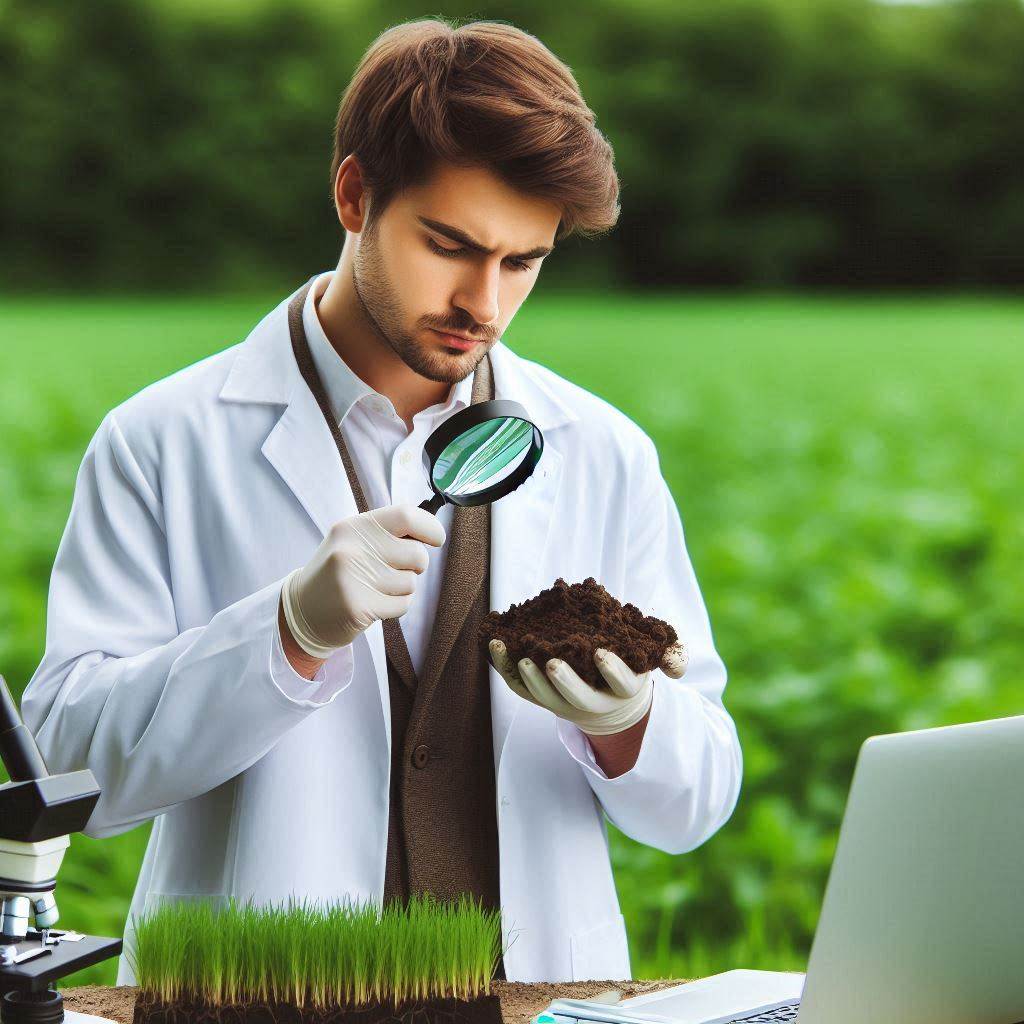Introduction
Soil scientists play a crucial role in agriculture and environmental science.
Their work directly impacts food production and sustainable land management.
By studying soil properties, they provide essential insights that improve crop yields.
They also contribute to environmental conservation by monitoring soil health and preventing degradation.
The importance of soil scientists grows as global challenges increase.
Climate change, pollution, and urbanization pose significant threats to soil resources.
Soil scientists help address these challenges through research and practical solutions.
Their expertise supports sustainable farming practices and enhances environmental stewardship.
To excel in this field, soil scientists must possess diverse skills.
A strong background in soil science principles is essential for understanding soil composition and properties.
Proficiency in data collection and analysis enables them to interpret soil test results effectively.
Knowledge of environmental regulations helps them navigate compliance requirements.
Effective communication skills are vital for conveying complex findings to various audiences.
Adaptability and problem-solving skills allow them to address unique soil-related issues.
Fieldwork experience equips them with hands-on skills necessary for real-world applications.
Continuous learning keeps them updated on the latest advancements in soil science.
Together, these skills empower soil scientists to make meaningful contributions to agriculture and environmental science.
Strong background in soil science
Education and Training in Soil Science Principles
A strong background in soil science forms the foundation for a successful career in this field.
Education plays a critical role in developing this knowledge.
Aspiring soil scientists typically pursue a degree in soil science, agronomy, or environmental science.
These programs cover essential principles that help students understand soil behavior and its importance.
Training in soil science principles includes studying soil formation processes.
Understanding how soils develop over time is crucial for effective land management.
Students learn about various soil types and their characteristics, such as texture, structure, and pH levels.
This knowledge allows soil scientists to assess soil health and quality accurately.
Understanding of Soil Composition, Classification, and Properties
Comprehending soil composition is vital for soil scientists.
They must analyze the mineral, organic, water, and air components within soils.
Each element contributes to the soil’s overall function and fertility.
For instance, organic matter enhances soil structure and nutrient availability.
This understanding enables soil scientists to recommend appropriate management practices.
Soil classification is another essential skill for soil scientists.
They categorize soils based on their properties and characteristics.
This classification helps determine soil suitability for specific crops or land uses.
Soil scientists use systems like the USDA Soil Taxonomy or the World Reference Base for Soil Resources.
Familiarity with these systems aids in making informed decisions about land management.
In addition to theoretical knowledge, practical training enhances a soil scientist’s expertise.
Fieldwork allows students to gain hands-on experience in soil sampling and analysis.
They learn how to collect soil samples, perform laboratory tests, and interpret results.
These skills are essential for assessing soil health and identifying potential issues.
Effective communication skills are also vital for soil scientists.
They must convey complex scientific information clearly to farmers, policymakers, and the public.
Writing reports and presenting findings is an integral part of their job.
Soil scientists often collaborate with other professionals, requiring them to communicate findings effectively.
A strong background in soil science is crucial for a successful career in this field.
Education and training provide the foundation for understanding soil composition, classification, and properties.
Practical experience enhances this knowledge, enabling soil scientists to make informed decisions about land management.
As the world faces challenges like food security and environmental sustainability, soil scientists play an essential role in addressing these issues.
Their expertise ensures the responsible management of our vital soil resources.
Read: U.S. Cities with the Most Opportunities for Environmental Scientists
Proficiency in data collection and analysis
Ability to Collect Soil Samples Accurately
Proficiency in data collection is crucial for soil scientists.
They must collect soil samples accurately to ensure reliable test results.
Accurate sampling involves using the correct tools and techniques.
Soil scientists use augers, trowels, and soil probes to collect samples from various depths.
Proper sampling techniques minimize contamination and ensure representative samples.
Soil scientists often follow established protocols for collecting samples.
They consider factors like soil type, location, and purpose of testing.
Taking multiple samples from different locations provides a more comprehensive overview of soil conditions.
Documenting the sampling process is essential.
Soil scientists record information about the sample location, depth, and environmental conditions.
This documentation helps in analyzing results and making recommendations later.
Accurate records also aid in tracking changes in soil health over time.
Analytical Skills to Interpret Soil Test Results Effectively
Once soil samples are collected, soil scientists analyze the data.
Proficiency in data analysis is vital for interpreting soil test results effectively.
They conduct various laboratory tests to assess soil properties, such as pH, nutrient levels, and organic matter content.
Understanding the significance of these properties is crucial.
Soil scientists must know how different nutrients affect plant growth and soil health.
They analyze data to determine nutrient deficiencies or toxicities in the soil.
This analysis informs their recommendations for soil management practices.
Soil scientists also use statistical methods to interpret data.
Statistical analysis helps identify trends and patterns in soil health.
It allows them to compare results across different locations or time periods.
By analyzing this data, soil scientists can draw meaningful conclusions about soil conditions.
Furthermore, proficiency in data analysis includes using software tools.
Soil scientists often use specialized software for data management and analysis.
These tools help visualize data, making it easier to identify trends and communicate findings.
For instance, GIS (Geographic Information Systems) software can map soil characteristics over large areas.
Effective communication of results is essential.
Soil scientists must present their findings clearly to clients, policymakers, and the public.
They prepare reports and presentations that summarize their analyses and recommendations.
Clear communication ensures that stakeholders understand the implications of the data.
Proficiency in data collection and analysis is essential for soil scientists.
Accurate soil sampling lays the foundation for reliable test results.
Analytical skills enable them to interpret data effectively, informing land management practices.
As the demand for sustainable agriculture grows, skilled soil scientists play a vital role in promoting soil health and productivity.
Their expertise ensures that agricultural practices support both food production and environmental conservation.
Read: Environmental Scientist vs. Ecologist: Roles and Differences in the US
Knowledge of environmental regulations
Understanding of Local and National Regulations Related to Soil Protection and Conservation
Soil scientists must have a strong understanding of environmental regulations.
They need to be familiar with local and national laws that govern soil protection.
Regulations can vary significantly between different regions and jurisdictions.
Soil scientists study these regulations to ensure compliance in their work.
These regulations address issues such as soil contamination, erosion, and conservation practices.
They help protect soil resources and promote sustainable land use.
Soil scientists stay updated on changes in these laws to provide accurate guidance.
Understanding regulations also involves knowing specific programs aimed at soil conservation.
For example, programs may include the Conservation Reserve Program (CRP) or Environmental Quality Incentives Program (EQIP).
These programs incentivize landowners to adopt practices that enhance soil health.
Soil scientists can help landowners navigate these programs effectively.
Ability to Navigate and Comply with Regulatory Requirements
Soil scientists must possess the ability to navigate complex regulatory requirements.
This skill is essential for ensuring compliance with environmental laws.
They assess soil conditions to determine if they meet regulatory standards.
When soil does not meet standards, soil scientists recommend corrective actions.
They collaborate with landowners, government agencies, and environmental organizations.
This collaboration ensures that all parties understand their responsibilities under the law.
Soil scientists often serve as intermediaries between landowners and regulatory agencies.
They help interpret regulations and advise on best practices for compliance.
Soil scientists also conduct environmental assessments and audits.
These assessments evaluate soil health and potential contamination risks.
By conducting these assessments, they identify areas that need attention.
They develop management plans that align with regulatory requirements.
In many cases, soil scientists prepare reports for regulatory agencies.
These reports document soil conditions and compliance with regulations.
They include data from soil tests, assessments, and management recommendations.
Clear and accurate reporting is vital for successful compliance.
Soil scientists may also participate in public outreach and education.
They inform landowners and communities about regulations affecting soil management.
This outreach helps raise awareness of soil conservation practices and regulatory requirements.
The ability to navigate regulations is critical as environmental concerns grow.
With increased focus on sustainability, compliance becomes more complex.
Soil scientists must adapt to changing regulations and emerging environmental challenges.
Knowledge of environmental regulations is crucial for soil scientists.
They must understand local and national laws related to soil protection and conservation.
Their ability to navigate and comply with regulatory requirements ensures responsible land management.
As soil health impacts agriculture and the environment, the role of soil scientists becomes increasingly important.
Their expertise helps promote sustainable practices that protect our soil resources for future generations.
Read: The Relationship Between U.S. Policy & Environmental Scientist Roles

Communication skills
Effective Written and Verbal Communication Skills to Convey Findings to a Variety of Audiences
Soil scientists must excel in communication skills.
They need effective written and verbal skills to convey complex findings.
Their work often involves sharing technical information with diverse audiences.
These audiences include farmers, policymakers, researchers, and the general public.
Soil scientists write reports, research papers, and proposals.
They present findings at conferences and community meetings.
Clear and concise communication is essential in these settings.
It helps ensure that audiences understand the implications of their research.
In addition to technical reports, soil scientists create educational materials.
These materials can include brochures, fact sheets, and online content.
They aim to inform stakeholders about soil health and conservation practices.
Good communication fosters greater public awareness and engagement.
Verbal communication is equally important.
Soil scientists often give presentations to varied audiences.
They must explain technical concepts in an accessible way.
This ability helps build relationships and trust with stakeholders.
Effective communication also involves active listening.
Soil scientists must listen to the concerns of farmers and landowners.
This understanding enables them to address specific needs in their recommendations.
Collaboration Skills to Work with Other Scientists, Farmers, and Stakeholders
Collaboration is vital in the field of soil science.
Soil scientists often work alongside other professionals in related disciplines.
These disciplines include agronomy, environmental science, and geology.
Working together fosters a comprehensive approach to solving soil-related issues.
They collaborate with farmers to develop best practices for soil management.
By understanding farmers‘ challenges, soil scientists can provide tailored solutions.
These partnerships can enhance soil health and crop productivity.
Soil scientists also engage with policymakers and government agencies.
They help shape policies related to soil conservation and agricultural practices.
Effective communication ensures that their insights inform decision-making processes.
This involvement can lead to better regulatory frameworks that support sustainable practices.
Stakeholder engagement is essential for successful soil management.
Soil scientists may work with community organizations and NGOs.
These collaborations help promote public awareness and involvement in soil conservation efforts.
Furthermore, interdisciplinary collaboration can lead to innovative solutions.
Soil scientists might team up with technologists to develop precision agriculture tools.
This approach enhances data collection and analysis, improving soil management strategies.
Networking is another crucial aspect of collaboration.
Soil scientists should attend workshops, conferences, and seminars.
These events provide opportunities to share ideas and best practices.
Networking fosters relationships that can lead to collaborative research projects.
Strong communication skills are essential for soil scientists.
They must convey findings effectively to diverse audiences.
Their ability to collaborate with other scientists, farmers, and stakeholders enhances their impact.
By fostering relationships and understanding, soil scientists can promote sustainable practices.
Their communication skills ultimately contribute to healthier soils and more productive agricultural systems.
As environmental challenges grow, these skills become increasingly important in addressing soil-related issues.
Read: Organizations & Associations for Environmental Scientists in the USA
Adaptability and problem-solving skills
Ability to Adapt to Different Soil Types and Environmental Conditions
Soil scientists must be adaptable to succeed in diverse environments.
They encounter various soil types, each with unique properties and challenges.
Understanding these differences is crucial for effective soil management.
Soil scientists study sandy, clayey, and loamy soils.
Each type behaves differently under various environmental conditions.
For example, sandy soils drain quickly, while clayey soils retain moisture.
This knowledge helps soil scientists develop tailored management strategies.
They often work in different geographic regions, which may have distinct climates and ecosystems.
Soil scientists must adjust their approaches based on local conditions.
For instance, they might focus on erosion control in hilly regions.
In contrast, they may prioritize drainage improvement in flat areas.
Soil scientists also face unexpected changes, such as climate variations or land-use alterations.
These factors can affect soil health and productivity.
Adaptability allows them to adjust research methods and recommendations accordingly.
Flexibility in research techniques is essential.
Soil scientists may need to use different sampling methods based on site conditions.
They might also employ various analytical techniques to assess soil health.
Skill in Troubleshooting Soil-Related Issues and Proposing Solutions
Problem-solving skills are vital for soil scientists.
They often encounter complex soil-related issues that require immediate attention.
For example, farmers may report poor crop yields or soil erosion problems.
Soil scientists begin by diagnosing the issue through thorough analysis.
They collect soil samples and perform tests to understand underlying problems.
This systematic approach helps identify causes, such as nutrient deficiencies or contamination.
Once they diagnose the issue, soil scientists propose effective solutions.
They draw on their knowledge of soil management practices and environmental regulations.
Recommendations may include soil amendments, cover cropping, or erosion control techniques.
Collaboration plays a crucial role in problem-solving.
Soil scientists work with farmers to implement recommended practices.
They ensure that solutions are practical and tailored to the specific situation.
Continuous education is also essential for soil scientists.
They must stay updated on emerging research and innovative techniques.
This knowledge enhances their ability to address new challenges effectively.
Soil scientists often utilize technology to aid in problem-solving.
Geographic Information Systems (GIS) and remote sensing provide valuable data.
These tools help them analyze soil properties and monitor changes over time.
Furthermore, networking with other professionals fosters collaborative problem-solving.
Soil scientists can share experiences and insights, leading to better solutions.
Adaptability and problem-solving skills are essential for soil scientists.
They must adjust to various soil types and environmental conditions.
Their ability to troubleshoot soil-related issues and propose practical solutions is crucial.
By continuously adapting and learning, soil scientists can effectively address challenges in the field.
Their skills contribute to sustainable agricultural practices and improved soil health.
As environmental conditions change, these abilities will become increasingly important for future generations.
Fieldwork experience
Hands-on Experience in Soil Sampling, Testing, and Analysis in Real-World Settings
Fieldwork experience is crucial for aspiring soil scientists.
It provides practical knowledge and skills that classroom learning cannot offer.
Soil scientists conduct fieldwork to collect soil samples from various locations.
This hands-on experience allows them to understand soil variability in real-world settings.
During fieldwork, soil scientists follow established protocols for sampling.
They learn to select representative samples that accurately reflect soil conditions.
Proper sampling techniques ensure reliable data for analysis.
Once they collect samples, soil scientists conduct various tests.
These tests assess soil properties such as pH, nutrient levels, and texture.
Understanding these properties is essential for effective soil management.
Fieldwork also helps scientists recognize signs of soil degradation.
They observe issues like erosion, compaction, and contamination firsthand.
This observation enhances their ability to diagnose problems in agricultural practices.
Real-world fieldwork exposes students to different land-use practices.
They learn how these practices affect soil health and sustainability.
This knowledge informs their recommendations for improving soil management.
Familiarity with Field Instrumentation and Equipment
Familiarity with field instrumentation is vital for soil scientists.
They utilize various tools and equipment to collect and analyze soil samples.
Common instruments include soil probes, augers, and pH meters.
Soil probes allow scientists to extract soil samples from different depths.
Augers facilitate the collection of larger samples for comprehensive analysis.
Understanding how to use these tools is critical for accurate data collection.
In addition to sampling tools, soil scientists use analytical equipment in the lab.
They employ spectrophotometers and chromatography to analyze soil composition.
Proficiency in using this equipment enhances their ability to interpret data.
Field experience helps students develop skills in equipment maintenance.
They learn to calibrate and troubleshoot instruments, ensuring accurate readings.
This knowledge is essential for conducting reliable research.
Furthermore, fieldwork teaches soil scientists how to work safely.
They learn to navigate potential hazards associated with field studies.
Knowledge of safety protocols protects them from accidents and injuries.
Collaboration during fieldwork is also beneficial.
Soil scientists often work in teams, sharing responsibilities and insights.
This collaboration fosters effective communication and problem-solving skills.
Overall, fieldwork experience is invaluable for soil scientists.
It equips them with practical skills in sampling, testing, and analysis.
Familiarity with field instrumentation enhances their research capabilities.
By gaining hands-on experience, soil scientists can address real-world soil challenges effectively.
These experiences contribute to their overall competence in the field.
As environmental issues evolve, skilled soil scientists will play a critical role in promoting sustainable practices.
Their practical knowledge will be essential for future advancements in soil science.
Find Out More: Public Outreach: Educating the Community about Zoology
Technology proficiency
Knowledge of GIS Mapping Software for Soil Mapping and Analysis
Technology proficiency is vital for modern soil scientists.
Geographic Information System (GIS) mapping software plays a crucial role in soil analysis.
GIS allows scientists to visualize, analyze, and interpret spatial data effectively.
Soil scientists use GIS to create detailed soil maps.
These maps help identify soil types and their distribution across landscapes.
Accurate mapping informs land use planning and management decisions.
With GIS software, soil scientists can analyze relationships between soil properties and environmental factors.
They assess how soil composition affects crop yields and land productivity.
This analysis aids in developing targeted soil management strategies.
Moreover, GIS facilitates data integration from various sources.
Soil scientists can combine field data with satellite imagery and climate information.
This integration enhances their understanding of soil dynamics and variability.
Training in GIS software is essential for aspiring soil scientists.
They learn to use mapping tools for soil assessment and research.
Proficiency in GIS increases their competitiveness in the job market.
Skills in Using Soil Sensors and Other Advanced Technologies for Data Collection
In addition to GIS, soil scientists must be adept at using soil sensors.
These sensors provide real-time data on soil moisture, temperature, and nutrient levels.
Accurate measurements are crucial for effective soil management practices.
Soil moisture sensors help farmers optimize irrigation schedules.
By monitoring moisture levels, they can reduce water waste and improve crop health.
This technology promotes sustainable agricultural practices and enhances water conservation.
Soil scientists also utilize advanced analytical tools in the lab.
Technologies like near-infrared spectroscopy (NIRS) enable rapid soil analysis.
These tools provide valuable insights into soil composition without extensive sample processing.
Familiarity with data logging systems is another important skill.
Soil scientists use data loggers to collect continuous data over time.
This capability allows for long-term monitoring of soil health and quality.
Moreover, drones are becoming increasingly popular in soil research.
Soil scientists use drones for aerial mapping and monitoring.
Drones can cover large areas quickly, providing detailed insights into soil conditions.
Understanding how to analyze data collected by these technologies is crucial.
Soil scientists must interpret complex datasets to make informed decisions.
This skill enhances their ability to address soil-related challenges effectively.
Technology proficiency also fosters collaboration among scientists.
They share data and findings using cloud-based platforms.
This collaboration accelerates research efforts and promotes knowledge sharing.
Overall, technology proficiency is essential for success in soil science.
Knowledge of GIS mapping software and soil sensors empowers scientists.
They can collect and analyze data to enhance soil management practices.
As technology evolves, soil scientists must adapt to remain effective.
Proficiency in these areas will significantly contribute to sustainable agriculture and environmental conservation.
Transform Your Career Today
Unlock a personalized career strategy that drives real results. Get tailored advice and a roadmap designed just for you.
Start NowContinuous learning and professional development
Commitment to Staying Updated on the Latest Soil Science Research and Practices
Continuous learning is crucial for soil scientists.
The field of soil science evolves rapidly with new research and technologies.
Staying updated ensures that soil scientists apply the latest findings effectively.
Reading scientific journals is one way to keep informed.
Journals publish peer-reviewed articles that highlight recent studies and breakthroughs.
These articles provide insights into emerging trends and techniques in soil management.
Online courses also offer opportunities for skill enhancement.
Many universities and institutions provide flexible learning options.
Soil scientists can access these courses from anywhere, making learning convenient.
Engaging with professional organizations is another effective method.
Organizations like the Soil Science Society of America (SSSA) provide valuable resources.
Membership offers access to exclusive publications, webinars, and networking opportunities.
Following reputable blogs and websites dedicated to soil science is beneficial.
These platforms often share insights and practical applications of new research.
Scientists can learn about innovative practices that improve soil health and productivity.
Participation in Conferences, Workshops, and Training Programs for Skill Enhancement
Attending conferences and workshops is essential for professional growth.
These events allow soil scientists to network with peers and industry leaders.
Participants can exchange ideas, share experiences, and discuss challenges.
Workshops often include hands-on training in new technologies and methodologies.
Soil scientists gain practical skills that they can apply directly to their work.
This experiential learning enhances their ability to tackle real-world issues.
Moreover, conferences feature presentations by leading researchers.
Scientists learn about cutting-edge studies and advancements in soil science.
This exposure broadens their knowledge and inspires innovative thinking.
Training programs offered by universities and organizations are also valuable.
These programs focus on specific areas of soil science, such as soil fertility or conservation.
By participating, soil scientists deepen their expertise and stay relevant in their field.
Networking at these events opens doors to collaboration opportunities.
Soil scientists can form partnerships with other professionals.
Collaborating on research projects enhances their knowledge base and skill set.
Incorporating new techniques into their work requires continuous learning.
Soil scientists must be adaptable to implement innovative practices.
Professional development helps them navigate the changing landscape of soil management.
Additionally, pursuing certifications can enhance credibility.
Certifications demonstrate a commitment to professionalism and expertise.
Soil scientists can earn certifications in various areas, such as soil conservation or nutrient management.
Finally, sharing knowledge with colleagues and students fosters a culture of learning.
Soil scientists can mentor others and contribute to the next generation of professionals.
This sharing of knowledge reinforces their understanding and keeps the community engaged.
Continuous learning and professional development are essential for soil scientists.
Staying updated on research and practices empowers them to make informed decisions.
Participation in conferences, workshops, and training programs enhances their skills.
Embracing lifelong learning ultimately strengthens the field of soil science and its impact on agriculture and environmental sustainability.
See Related Content: The Importance of Geology in Urban Planning
Conclusion
Successful soil scientists possess essential skills that contribute to their effectiveness.
A strong background in soil science forms the foundation of their expertise.
Proficiency in data collection and analysis enables them to interpret complex results accurately.
Knowledge of environmental regulations ensures compliance and promotes sustainable practices.
Effective communication skills allow soil scientists to share their findings with diverse audiences.
Adaptability and problem-solving skills help them address various soil-related challenges.
Fieldwork experience provides hands-on training crucial for real-world applications.
Technology proficiency equips them to utilize advanced tools for better data collection and analysis.
Continuous learning and professional development keep soil scientists informed about the latest advancements.
These skills collectively empower them to make significant contributions to agriculture and environmental conservation.
Soil science plays a vital role in promoting sustainable farming practices.
It helps ensure food security while protecting natural resources.
As global challenges like climate change intensify, soil scientists’ expertise becomes increasingly essential.
Their work directly impacts agricultural productivity and ecosystem health.
Encouraging aspiring soil scientists to cultivate these skills is crucial.
Investing in education and training leads to a rewarding career in soil science.
The ongoing importance of this field cannot be overstated.
[E-Books for Sale]
The Big Book of 500 High-Paying Jobs in America: Unlock Your Earning Potential
$19.99 • 500 High-Paying Jobs • 330 pages
Explore 500 high-paying jobs in America and learn how to boost your career, earn more, and achieve success!
See All 500 High-Paying Jobs of this E-Book
1001 Professions Without a Degree: High-Paying American Jobs You Can Start Now
$19.99 • 1001 Professions Without a Degree • 174 pages
Discover 1001 high-paying jobs without a degree! Unlock career tips, skills, and success strategies for just $19.99!




